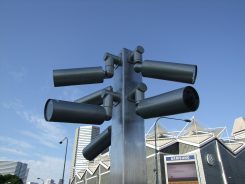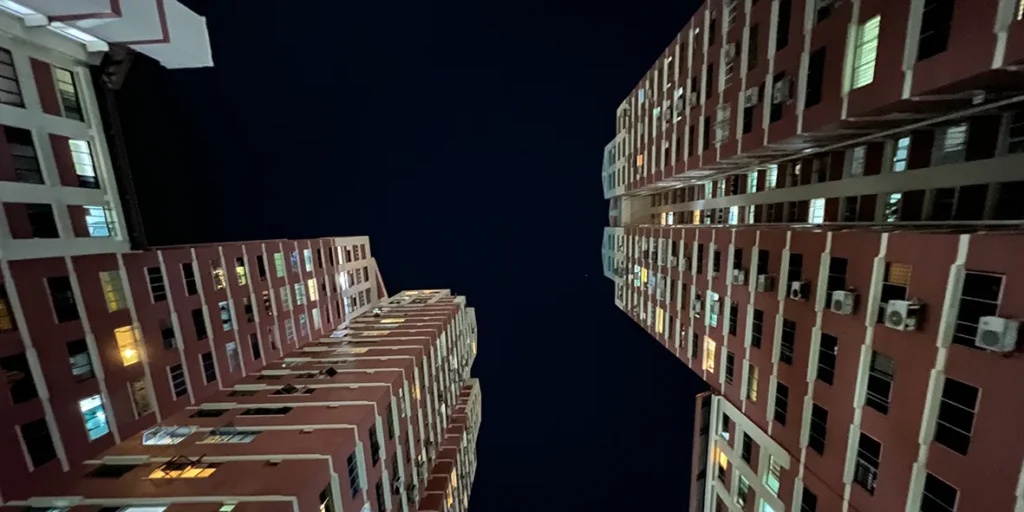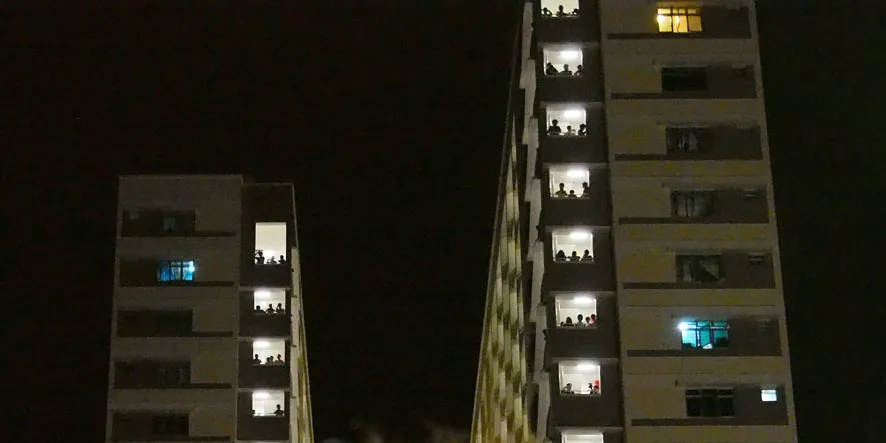This piece is co-published with AcademiaSG, a scholarly site promoting scholarship of/by/for Singapore.
••••••••
Singapore’s public housing program is sui generis, un-replicable in its entirety anywhere.
During the 1959 election campaign for the first fully elected parliament for domestic self-government, the People’s Action Party (PAP) promised to improve the living conditions of Singaporeans. One year after being elected, it established the Housing and Development Board (HDB) to undertake a public housing program to fulfil its promise.
From the outset, the housing program was a political good and the HDB has been practically synonymous with the PAP government. For Singaporeans, HDB flats are ‘government housing’. Beginning with providing one-room rental flats in low-cost, low-rise walk-up blocks for the poor, the HDB began to develop larger flats—with two or three bedrooms, sitting-room, dining room, kitchen, and multiple toilet facilities—to let on a 99-year lease. By the mid-1980s, up to 85% of resident households were housed in HDB flats, with more than 80% holding a 99-year lease on their flats. This achievement is built on three essential elements.
First, the availability of land to the state. Combining the transfer of colonial Crown land, the aggressive compulsory land expropriation from private landlords in the 1960s and 70s, and extensive coastal land reclamation, the Singapore state owns approximately 90% of the land in the country. Land is thus effectively nationalised and readily available for all national development purposes, including public housing.
Second, the availability of financial loans to enable households to purchase the 99-year lease on HDB flats. Conventionally, mortgages from commercial financial institutions, such as banks, are available only for the creditworthy, leaving those with low and/or uncertain incomes out of homeownership. An inclusive solution that can provide all Singaporean households with at least one steadily employed member access to a mortgage was facilitated by allowing the leaseholders to make pre-retirement withdrawals from their compulsory social security savings; namely, the individual’s Central Provident Fund (CPF) savings, which is extracted at the source of employment.
The HDB holds the mortgage for the 99-year leaseholder, the CPF makes the monthly payment to the HDB from the latter’s monthly savings. The interest charged by the HDB on the loan is fixed at half a percentage point above the interest paid by the CPF to the individual’s savings; it is effectively interest-free. The entire transaction is contained within a closed circuit of financing, without incurring generally higher mortgage interest rates from commercial financial institutions. With the facility of CPF payment, introduced in 1968, the rate of 99-year leaseholdings on public housing flats rose rapidly, covering practically the entire nation, except for the top 10–15% of high-income households who reside in the expensive private housing sector and, the 5–6% of the poor who rent small HDB flats.
Third, as indicated above, the transaction is both legally and substantively long-term renting. Instead of paying monthly rent, the total rent for the 99 years is paid at one go when the flat is handed over to the leaseholder. A loan is thus required to enable the tenant to pay the cost of the lease. This loan is organised as a conventional mortgage, in which the leaseholder pays, monthly, the interest and a portion of the loan sum, until full payment is made at the end of the agreed loan period. Beyond that, the leaseholder lives rent free till the end of the 99-year lease. The mortgage-like financing makes the long-term leasing similar to conventional purchasing of property, hence the leased flat is re-labelled as a flat “sold” by the HDB. The size of the leased flat is dependent on households’ ability to pay rather than on spatial needs: a high-income small family can lease a five-room flat, while a low-income large family will have to make do with a smaller three-room flat.
In these ways, the leased flat is transformed into a market commodity, not a social welfare good. As commodity, the leaseholder has the right to transfer, or “sell”, the lease directly to a buyer in the market, as in any conventional property transaction. In this sense the leaseholder can act, and be addressed, as a “homeowner”. This is an ideological gloss that is advantageous to the government as it renders Singapore a “nation of homeowners”.
Ironically, the three critical features of nationalisation of land, use of CPF, and 99-year lease that explain the success of the public housing program are also the same features that have systemically generated tensions or contradictions in the program.
Ghim Moh estate. HDB home ownership amounts to long-term renting. Instead of paying monthly rent, the total rent for the 99 years is paid upfront when the flat is handed over to the leaseholder. (Photo: Chen Si Yuan)
From welfare good to wealth-building asset
The PAP government’s intention of selling rather than renting public housing flats was already scripted into the 1959 Housing and Development Act. Financially, proceeds from the sale of flats would enable the government to maintain public subsidies to the national public housing program within tolerable limits of the national budget. The practical rationale behind permitting the sale of leases is to allow households to upgrade their housing as demand for space grows in tandem with the growth of the family. Ideally, a household is expected to sell its first subsidised HDB flat, known as “resale” flat, at market value and, with the profit finance the upgrade to the second, larger subsidised flat to meet increased spatial needs. Coincidentally, this would also improve its housing wealth. The financial benefit from the buy–sell–repurchase cycle is so obvious that it is commonly known as “two bites of the cherry”.
A resale flat tends to fetch a higher price than a new subsidised flat because it tends to be in “mature” estates. These are closer to the city and offer better access to social amenities such as schools, polyclinics, shopping malls, and public transportation infrastructure. Most significantly, buyers of resale flats can avoid the long years of queuing for new flats from the HDB. With the exception of brief periods of economic recession, prices of resale flats have risen persistently since the early 1970s, when households were first allowed to sell their flats in the resale market.
Anticipation of profit from buying and selling the first subsidised flat has become so taken for granted that even young professionals who, with financial assistance from their high-income parents would be able to buy in the private condominium sector, are queuing up for relatively high-cost new HDB flats in highly desirable locations, with full intention to sell them after the minimum five-year residency period. This could reap significant profit to finance subsequent private sector purchases. The glaring example is the iconic 50-story development, “The Pinnacle” in Tanjong Pagar. Prices of these flats have effectively doubled from their original cost and leaseholders have made outsized profits when their flats were sold in breakthrough resale prices exceeding one million dollars.

When to stop learning from Singapore: data, surveillance and Australian business
More data means more risk., and a system focused on control is not—it turns out—one that is particularly nimble or responsive.
Subsidised public housing has become a vehicle for private accumulation of wealth. In principle, this is an opportunity open to all Singaporeans who are eligible to buy a flat from the HDB. In practice, however, the households who are able to capitalise on the opportunity are those in the higher-income groups who purchase four or five-room flats or executive condominiums. Even if a household in the lower-middle class is able to benefit from the sale of its three-room flat, the rate and quantum of profit would be much less than that derived from the sale of larger flats. Profit from the sale of the flat can be reinvested in the private sector property or other assets for further capital accumulation. Additionally, given that the buyers of resale flats tend to be the younger generation who are fresh entrants into the housing market, the gains of the older generation sellers are effectively passed on as financial burdens of the young; as in my uncle makes money from your nephew and your uncle makes money from mine.
Profit taking from the buying and selling of public housing flats is widely known to both the public and the government. Indeed, the government encourages it by explicitly touting the 99-year lease ownership as the most valuable asset it could give to citizens. As discussed in the next section, the government has to allow existing public housing flats to increase in monetary value because most existing leaseholders depend on recovering cash from the flat to fund future retirement needs. However, when outsized profits offend the public’s sense of fairness or social justice, the government is compelled to intervene by erecting some obstacles to such gains. These include differentiated pricing of flats in differently preferred locations, extending the minimum residency period from five to ten years, and a claw back of 6% of the profits gained from resale flats. However, these are only tweaks to the system, not a solution to the in-built profit logic of the HDB flat as commodity.
The greatest irony of the national public housing program then: public subsidies that are meant to be socially distributive and level inequality have in fact contributed to intensifying wealth inequality across generations, and between the haves and have-nots in society.

Sin Ming. Subsidized public housing has become a vehicle for the private accumulation of wealth. (Photo: Wzhkevin)
Public housing as an asset-based welfare system
Allowing the use of CPF savings to pay for 99-year leases on HDB flats has two long term consequences. First, for most households, most of their savings would have gone to paying for their flats. In principle, after the full cost of the lease is paid, subsequent savings from not having to make payment should accumulate, over time, to fund the leaseholder’s retirement years. In reality, leaseholders seldom have the luxury to be so farsighted, given the financial pressures of everyday life. It is more likely that they would end up “asset rich but cash poor”. Having encouraged the entire nation to invest in public housing “ownership”, the HDB/government is thus responsible to assist the leaseholders to monetise the flat/asset to fund their retirement.
Indeed, the HDB has developed several schemes to enable senior leaseholders to “cash out”. These include incentivising empty-nest leaseholders to sell their existing flats and repurchase a new two-room flat with a flexible length of lease of up to when one of the spouses reaches 95 years of age; a lease-buy-back scheme in which the unused tail-end of the 99-year lease is sold to the HDB for an annuity payment and, more radically, under the Selective Enbloc Redevelopment Scheme, old estates in high land value locations are repossessed by the HDB. Affected households are compensated for their flats at prevailing market value. They are in turn resettled in new flats close to the demolished estates, with varying lengths of fresh leases.
The second consequence concerns the pricing of existing resale flats. If the flat were to meet the retirement needs of the leaseholder, its price cannot be allowed to fall precipitously. Yet with the wear and tear of use and a shortening lease, the leaseholder could potentially end up in negative equity, i.e. the flat would be worth less than its original price. This would jeopardise the leaseholder’s retirement life. To avoid this, new flats must be priced relatively to maintain prices of existing flats. This sets up a vicious spiral in which the two prices play catch-up in an ever-upward spin, making public housing increasingly unaffordable to the new entrants into the market for their first home. The HDB/government is thus compelled to provide increasingly higher cash grants to enable the new entrants to make their first purchase. But cash grants do not reduce prices of resale or new flats. Instead, they are likely to push up the prevailing high prices. The HDB/government is thus engaged, unendingly, in a balancing act of ensuring existing flats keep their value and the affordability of flats to new entrants into the market. It is constantly reacting to market pressure rather than being in control of determining the prices of public housing flats.
Beyond the extensive programs to assist leaseholders to monetise their flats, there remains the problem of the inexorable shortening leases on all existing flats and their progressive devaluation. This is where the ideological gloss of “homeownership” is exposed. Legally, at the end of the 99-year lease, the flat would have zero value and should be returned to the HDB and the land to the state. However, leaseholders are unlikely to accept this with equanimity. Should the incumbent government forcefully repossess the flats, the political cost would definitely be very substantial. As the oldest HDB flats pass the halfway point in the 99-year lease, the need to resolve this issue will become increasingly urgent — financially and politically.

Viewing an election rally from HDB blocks. Singaporeans’ dependency on public housing has become a political threat that cuts both ways. (Photo: Cherian George)
Politics of monopolising provision
With land effectively nationalised, there is no space for alternative housing, as in the kampong of the past. All Singaporeans, from the middle class downwards, are dependent on the HDB for housing. This dependency gives the government, via the HDB, very significant control over the lives of Singaporeans. Unpopular social policies, such as restrictions on singles and the ethnic integration policy, can piggy-back as part of the eligibility criteria for access to HDB flats. The most egregious was the attempt to extract votes in general elections by threatening to withhold estate upgrading programs and other services in public housing estates where the residents have voted for a non-PAP candidate. Upgrading programs are important because they contribute to the maintenance of an estate’s environment and the values of existing flats. In the 1997 general election, Prime Minister Goh Chok Tong could not be more blunt: “Your estate through your own choice will be left
Source link
Loading PerspectiveSplit analysis...









